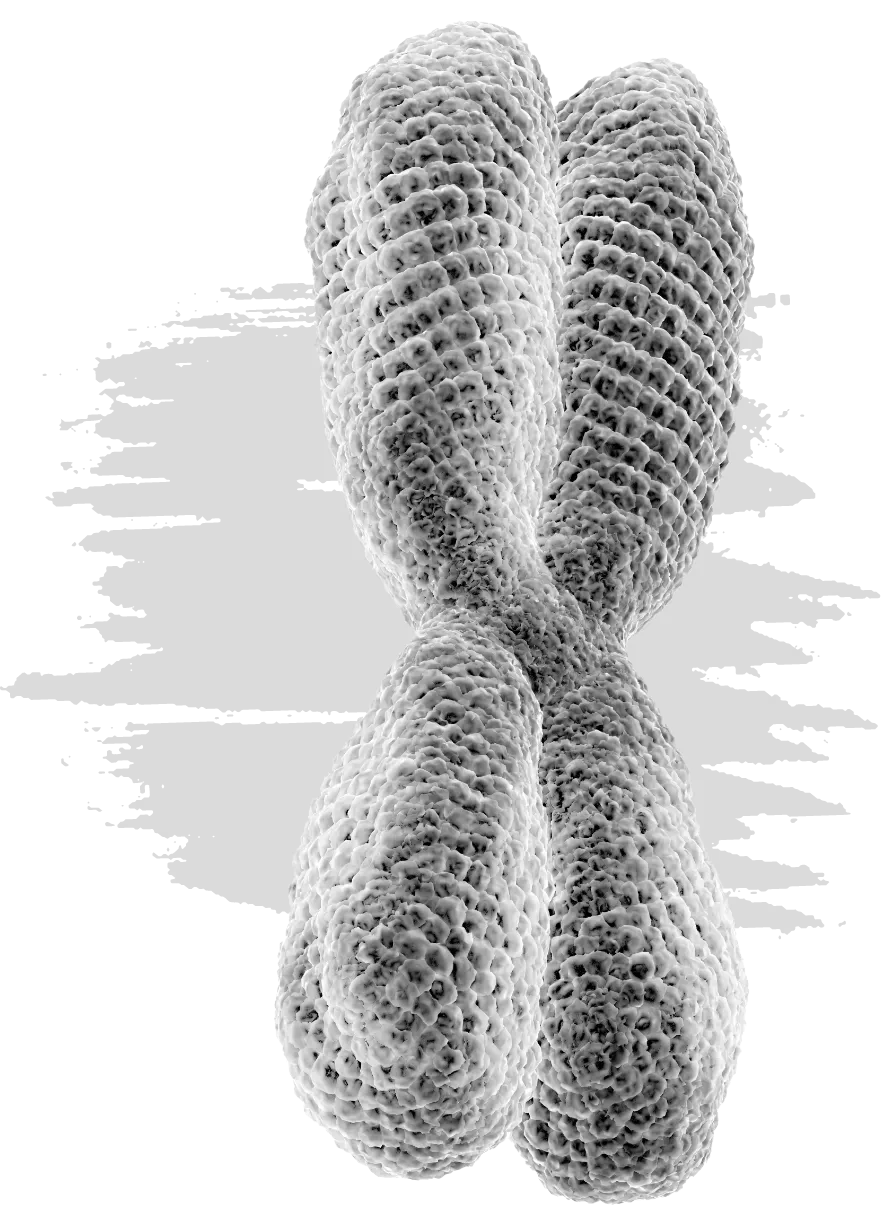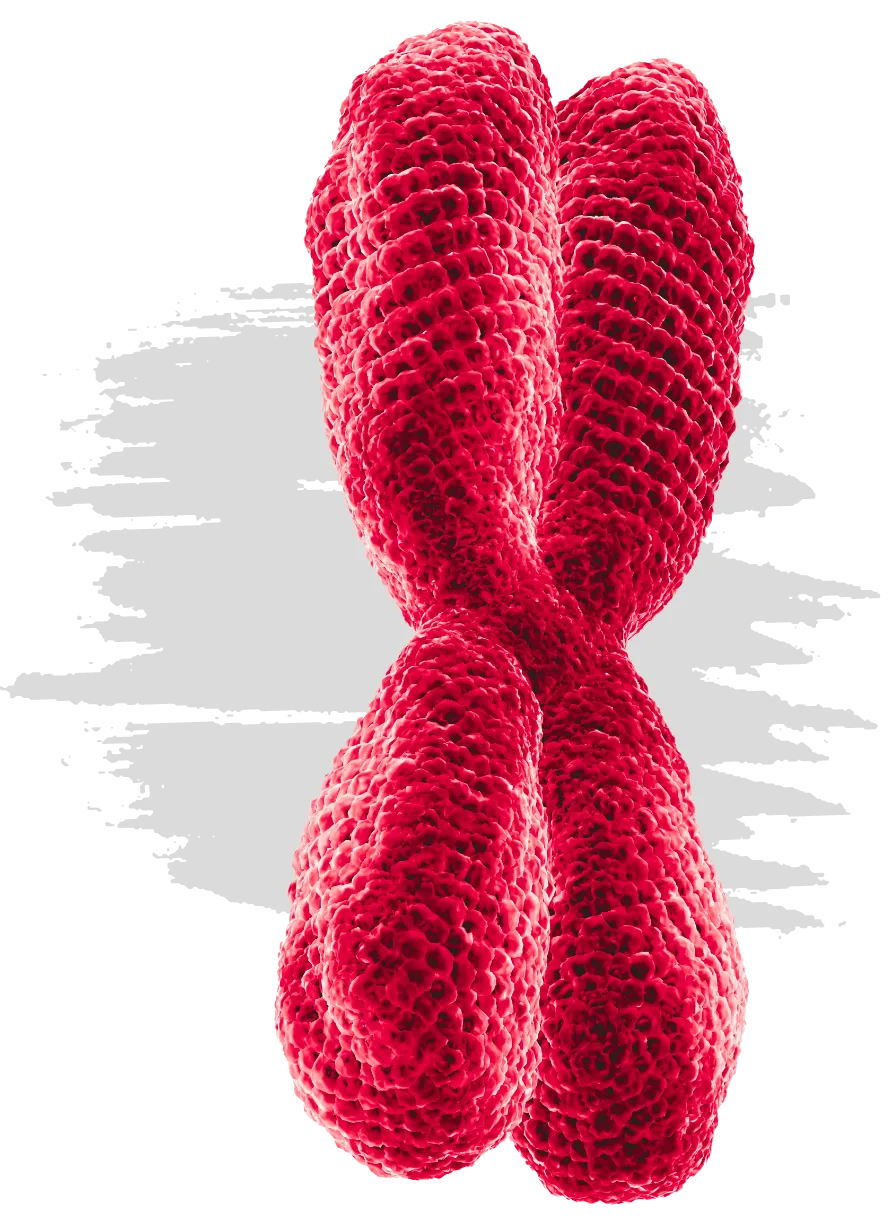AMKD HAS A GENETIC CAUSE


APOL1-mediated kidney disease is a genetic disease caused by 2 risk variants of the APOL1 gene (G1/G1, G1/G2, or G2/G2) and a second hit.1 APOL1 damages the podocytes and glomerular endothelial cells by creating channels in these cells, resulting in glomerular dysfunction and proteinuria.2-7 Not all people with 2 risk variants will develop AMKD.8 A second hit of infection or inflammation is required to trigger disease.1,9,10 The second hit that triggered the disease may not be obvious to the patient or physician.11
We know that AMKD has a genetic basis, because genome association studies have shown that 2 APOL1 risk variants significantly increase the risk of proteinuric kidney diseases, including:
We know that AMKD has a genetic basis, because genome association studies have shown that 2 APOL1 risk variants significantly increase the risk of proteinuric kidney diseases, including:
We know that AMKD has a genetic basis, because genome association studies have shown that 2 APOL1 risk variants significantly increase the risk of proteinuric kidney diseases, including:
(Some odds ratios have been rounded. See referenced literature for more detailed ranges)
(Some odds ratios have been rounded. See referenced literature for more detailed ranges)
(Some odds ratios have been rounded. See referenced literature for more detailed ranges)
HIV-associated nephropathy12,13:
29xto89x
FSGS12:
17x
hypertension-attributed
end-stage kidney disease14:
7x
Lupus nephritis with end-stage
kidney disease or collapsing features15,16:
2.5xto5x
Nondiabetic chronic kidney disease8:
3xto4x
AMKD occurs in people of African Ancestry
APOL1 risk variants developed in people living in Africa, because the risk variants provided enhanced protection against the parasite that causes human African trypanosomiasis.8 Trypanosomiasis and AMKD are like malaria and sickle cell disease: a gene conferred an evolutionary advantage against one disease and, at the same time, created a new disease burden.17
Sign up for More
Be the first to get updates on the latest news and developments from this site.
FSGS: focal segmental glomerulosclerosis
References: 1. Friedman DJ, Pollak MR. APOL1 and kidney disease: from genetics to biology. Annu Rev Physiol. 2020;82:323-342. doi:10.1146/annurev-physiol-021119-034345 2. Giovinazzo JA, Thomson RP, Khalizova N, et al. Apolipoprotein L-1 renal risk variants form active channels at the plasma membrane driving cytotoxicity. eLife. 2020;9:e51185. doi:10.7554/eLife.51185 3. Olabisi OA, Zhang JY, VerPlank L, et al. APOL1 kidney disease risk variants cause cytotoxicity by depleting cellular potassium and inducing stress-activated protein kinases. Proc Natl Acad Sci U S A. 2016;113(4):830-837. doi:10.1073/pnas.1522913113 4. Olabisi OA, Heneghan JF. APOL1 nephrotoxicity: what does ion transport have to do with it? Semin Nephrol. 2017;37(6):546-551. doi:10.1016/j.semnephrol.2017.07.008 5. Schaub C, Verdi J, Lee P, et al. Cation channel conductance and pH gating of the innate immunity factor APOL1 are governed by pore-lining residues within the C-terminal domain. J Biol Chem. 2020;295(38):13138-13149. doi:10.1074/jbc.RA120.014201 6. Chen TK, Tin A, Peralta CA, et al. APOL1 risk variants, incident proteinuria, and subsequent EGFR decline in blacks with hypertension-attributed CKD. Clin J Am Soc Nephrol. 2017;12(11):1771-1777. doi:10.2215/CJN.01180117 7. Ma L, Divers J, Freedman BI. Mechanisms of injury in APOL1-associated kidney disease. Transplantation. 2019;103(3):487-492. doi:10.1097/TP.0000000000002509 8. Friedman DJ, Pollak MR. APOL1 nephropathy: from genetics to clinical applications. Clin J Am Soc Nephrol. 2021;16(2):294-303. doi:10.2215/CJN.15161219 9. May RM, Cassol C, Hannoudi A, et al. A multi-center retrospective cohort study defines the spectrum of kidney pathology in Coronavirus 2019 Disease (COVID-19). Kidney Int. 2021;100(6):1303-1315. doi:10.1016/j.kint.2021.07.015 10. Nichols B, Jog P, Lee JH, et al. Innate immunity pathways regulate the nephropathy gene Apolipoprotein L1. Kidney Int. 2015;87(2):332-342. doi:10.1038/ki.2014.270 11. Bruggeman LA, O’Toole JF, Sedor JR. APOL1 polymorphisms and kidney disease: loss-of-function or gain-of-function? Am J Physiol Renal Physiol. 2019;316(1):F1-F8. doi:10.1152/ajprenal.00426.2018 12. Kopp JB, Nelson GW, Sampath K, et al. APOL1 genetic variants in focal segmental glomerulosclerosis and HIV-associated nephropathy. J Am Soc Nephrol. 2011;22(11):2129-2137. doi:10.1681/ASN.2011040388 13. Kasembeli AN, Duarte R, Ramsay M, et al. APOL1 risk variants are strongly associated with HIV-associated nephropathy in black South Africans. J Am Soc Nephrol. 2015;26(11):2882-2890. doi:10.1681/ASN.2014050469 14. Genovese G, Friedman DJ, Ross MD, et al. Association of trypanolytic APOL1 variants with kidney disease in African Americans. Science. 2010;329(5993):841-845. doi:10.1126/science.1193032 15. Freedman BI, Langefeld CD, Andringa KK, et al. End-stage renal disease in African Americans with lupus nephritis is associated with APOL1. Arthritis Rheumatol. 2014;66(2):390-396. doi:10.1002/art.38220 16. Larsen CP, Beggs ML, Saeed M, Walker PD. Apolipoprotein L1 risk variants associate with systemic lupus erythematosus-associated collapsing glomerulopathy. J Am Soc Nephrol. 2013;24(5):722-725. doi:10.1681/ASN.2012121180 17. Kato GJ, Piel FB, Reid CD, et al. Sickle cell disease. Nat Rev Dis Primers. 2018;4:18010. doi:10.1038/nrdp.2018.10
